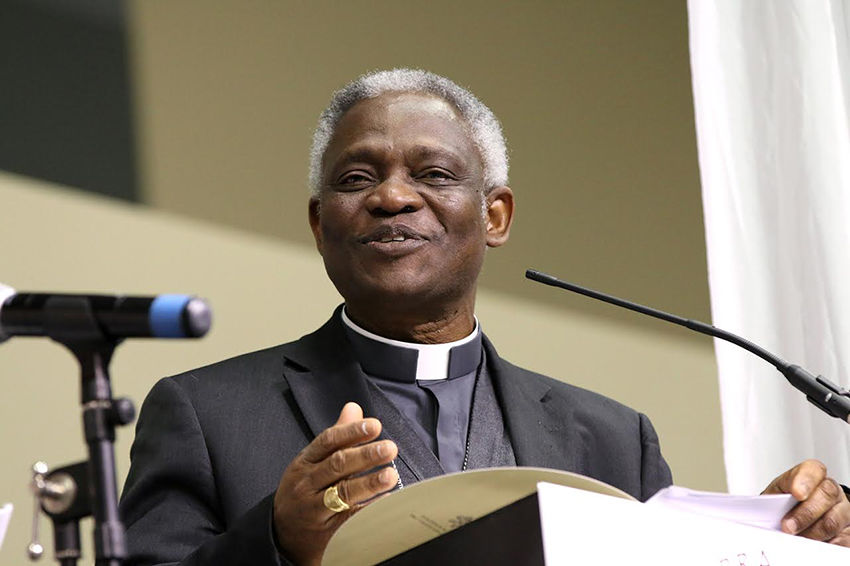MODESTO — Pope Francis gave strong words of encouragement to the more than 600 members of grassroots organizations gathered for the U.S. Regional World Meeting of Popular Movements conference Feb. 16-19.
Pope Francis initiated the first such meeting in 2014 to bring Church and grassroots leaders together to strive for justice in the areas of “Land, Work and Housing.” The letter addressed “walls and fear” as well as “bridges and love.”
“The grave danger is to disown our neighbors,” the pope said in a statement read by Cardinal Peter Turkson, prefect of Dicastery for Integral Human Development, and Fabiola Alvarez Carrasco of the Inland Congregations United for Change.
“The processes of dehumanization accelerate,” the pope said. “The direction taken beyond this historic turning point — the ways in which the worsening crisis gets resolved — will depend on people’s involvement and participation and, largely, on yourselves, the popular movements.”
He described the bleak reality of “the prevailing paradigm” that “causes enormous suffering to the human family, simultaneously assaulting people’s dignity and our common home in order to sustain the invisible tyranny of money that only guarantees the privileges of a few.”
Yet, the pope wrote, “the light of the love of neighbor may illuminate the Earth” that “may wake us up and let true humanity burst through with authentic resistance, resilience and persistence.” The pope called on the movements to “defend Creation.”
The parable of the Good Samaritan teaches that “compassion, love, is not a vague sentiment, bur rather means taking care of the other to the point of personally paying for him,” the pope said. This stands in stark contrast to “what is politically correct of ideologically fashionable” to look “at those who suffer without touching them.” This worldview does nothing “to confront the structures that leave so many brothers and sisters by the wayside.”
“Jesus teaches us a different path,” the pope said. “Do not classify others in order to see who is a neighbor and who is not.”
The pope repeated a reflection from a recent World Meeting of Popular Movements at the Vatican a few months ago, that “no people is criminal and no religion is terrorist.”
“There are fundamentalists and violent individuals in all peoples and religions — and with intolerant generalizations they become stronger because they feed on hate and xenophobia,” the pope said. “By confronting terror with love, we work for peace.”
In the letter, the pope also expressed that the desire for similar efforts to take place in other dioceses “because it builds bridges between peoples and individuals.”
In his remarks, Cardinal Turkson said, referencing Pope Francis, “It is not possible for the sheep to have an odor that the pastor does not have. When this happens, there is a disconnect.”
The cardinal also explained that the conference, which had been planned last year, was in no means meant to “bash” the Trump administration. “It is just coincidence,” he said of the timely themes.
“We are the protagonists of change. We are not passive objects,” Cardinal Turkson said, adding that development is part of human nature, that human beings have “a vocation to realize ourselves.”
The cardinal, who is from Ghana, also shared a saying from West Africa, comparing the solidarity of the movements to the bristles of a broom.
“Together, it is not breakable,” he said. “Solidarity means confronting the destructive effects if money. No doubt, your voice causes embarrassment to certain structures in society. Human dignity must be at the core of the change that you seek.”
Cardinal Turkson, in a rephrasing of the Golden Rule, said “Let us seek for others the opportunity we seek for ourselves.”
“The human person was created in relationship,” he said. “Outside of relationship none of us exists. We are created in relationship to God, to one another and with the Earth. Respect of the relationship in which we were created is the first meaning of justice.”
When the demands of these relationships are respected, there is justice.
“But when we disregard the demands relationships in which we stand, we are sinners, we are unjust,” he said. “And that’s what this is all about.”
Juan Grabois, of the Confederación de Trabajadores de la Economia Popular and co-founder of the World Meeting of Popular Movements, said the intention of the meeting is to never forget “the forgotten of all the world,” those victims of “the culture of discard.”
“The economy is at the service of the people, not of capital,” he said. “We want to unite our people in peace and justice, standing against violence and racism and for the environment. Let us take we learn here back and let us act on it.”

